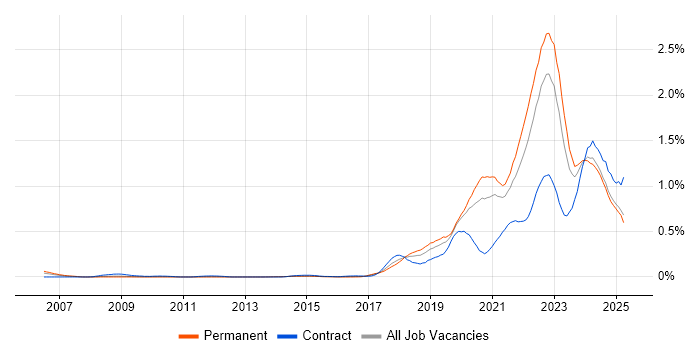Data Engineering
England > Midlands
The table below provides summary statistics for permanent job vacancies advertised in the Midlands requiring Data Engineering skills. It includes a benchmarking guide to the annual salaries offered in vacancies that cited Data Engineering over the 6 months leading up to 7 May 2025, comparing them to the same period in the previous two years.
| 6 months to 7 May 2025 |
Same period 2024 | Same period 2023 | |
|---|---|---|---|
| Rank | 205 | 158 | 124 |
| Rank change year-on-year | -47 | -34 | +47 |
| Permanent jobs citing Data Engineering | 54 | 170 | 256 |
| As % of all permanent jobs advertised in the Midlands | 0.76% | 1.45% | 2.70% |
| As % of the Processes & Methodologies category | 0.83% | 1.76% | 2.80% |
| Number of salaries quoted | 41 | 100 | 73 |
| 10th Percentile | £37,500 | £35,000 | £36,250 |
| 25th Percentile | £42,500 | £41,492 | £44,186 |
| Median annual salary (50th Percentile) | £57,500 | £57,500 | £55,000 |
| Median % change year-on-year | - | +4.55% | -18.52% |
| 75th Percentile | £68,750 | £70,000 | £67,500 |
| 90th Percentile | £87,500 | £98,250 | £77,500 |
| England median annual salary | £80,000 | £70,000 | £75,000 |
| % change year-on-year | +14.29% | -6.67% | -6.25% |
All Process and Methodology Skills
Midlands
Data Engineering falls under the Processes and Methodologies category. For comparison with the information above, the following table provides summary statistics for all permanent job vacancies requiring process or methodology skills in the Midlands.
| Permanent vacancies with a requirement for process or methodology skills | 6,539 | 9,665 | 9,150 |
| As % of all permanent jobs advertised in the Midlands | 91.49% | 82.42% | 96.57% |
| Number of salaries quoted | 2,675 | 7,138 | 4,622 |
| 10th Percentile | £27,500 | £26,250 | £30,000 |
| 25th Percentile | £35,000 | £34,834 | £38,357 |
| Median annual salary (50th Percentile) | £50,000 | £47,500 | £52,500 |
| Median % change year-on-year | +5.26% | -9.52% | +5.00% |
| 75th Percentile | £63,750 | £61,500 | £67,500 |
| 90th Percentile | £76,250 | £75,000 | £78,200 |
| England median annual salary | £57,500 | £55,000 | £62,500 |
| % change year-on-year | +4.55% | -12.00% | +4.17% |
Data Engineering
Job Vacancy Trend in the Midlands
Job postings citing Data Engineering as a proportion of all IT jobs advertised in the Midlands.

Data Engineering
Salary Trend in the Midlands
3-month moving average salary quoted in jobs citing Data Engineering in the Midlands.
Data Engineering
Salary Histogram in the Midlands
Salary distribution for jobs citing Data Engineering in the Midlands over the 6 months to 7 May 2025.
Data Engineering
Job Locations in the Midlands
The table below looks at the demand and provides a guide to the median salaries quoted in IT jobs citing Data Engineering within the Midlands region over the 6 months to 7 May 2025. The 'Rank Change' column provides an indication of the change in demand within each location based on the same 6 month period last year.
| Location | Rank Change on Same Period Last Year |
Matching Permanent IT Job Ads |
Median Salary Past 6 Months |
Median Salary % Change on Same Period Last Year |
Live Jobs |
|---|---|---|---|---|---|
| West Midlands | -26 | 35 | £56,250 | -7.38% | 28 |
| East Midlands | +6 | 19 | £65,000 | +54.78% | 18 |
| Data Engineering England |
|||||
Data Engineering
Co-occurring Skills and Capabilities in the Midlands by Category
The follow tables expand on the table above by listing co-occurrences grouped by category. The same employment type, locality and period is covered with up to 20 co-occurrences shown in each of the following categories:
|
|
||||||||||||||||||||||||||||||||||||||||||||||||||||||||||||||||||||||||||||||||||||||||||||||||||||||||||||
|
|
||||||||||||||||||||||||||||||||||||||||||||||||||||||||||||||||||||||||||||||||||||||||||||||||||||||||||||
|
|
||||||||||||||||||||||||||||||||||||||||||||||||||||||||||||||||||||||||||||||||||||||||||||||||||||||||||||
|
|
||||||||||||||||||||||||||||||||||||||||||||||||||||||||||||||||||||||||||||||||||||||||||||||||||||||||||||
|
|
||||||||||||||||||||||||||||||||||||||||||||||||||||||||||||||||||||||||||||||||||||||||||||||||||||||||||||
|
|
||||||||||||||||||||||||||||||||||||||||||||||||||||||||||||||||||||||||||||||||||||||||||||||||||||||||||||
|
|
||||||||||||||||||||||||||||||||||||||||||||||||||||||||||||||||||||||||||||||||||||||||||||||||||||||||||||
|
|
||||||||||||||||||||||||||||||||||||||||||||||||||||||||||||||||||||||||||||||||||||||||||||||||||||||||||||
|
|
||||||||||||||||||||||||||||||||||||||||||||||||||||||||||||||||||||||||||||||||||||||||||||||||||||||||||||
